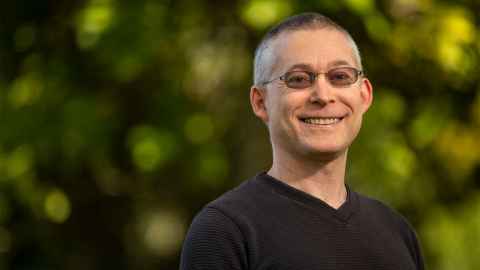Challenging stereotypes in computer science
9 October 2019
The image of a computer scientist as someone hunched over a keyboard, most likely male, with little interest in the wider social world, is one Dr Andrew Luxton-Reilly has dedicated his career to changing.

Awarded a National Tertiary Teaching Excellence Award, Dr Luxton-Reilly’s approach to teaching computer science focuses on transforming the classroom and the way the subject is introduced at the University of Auckland.
While it’s often hard to change perceptions, he says that’s what makes his job so rewarding.
“One of the reasons I love what I do is that it’s a challenge. We know our discipline is plagued by negative stereotypes and has the worst gender equity of any subject and we need to change that.
“By developing inclusive learning environments and by making all students aware of things like inherent bias, my aim is to ensure computer science is welcoming to everyone.”
Dr Luxton-Reilly’s own learning journey probably helps. He began tertiary study in the humanities, graduating with both a bachelors and masters in arts before switching to undergraduate teaching in the then School of Mathematical and Information Sciences.
“My background meant I learned to think broadly and critically about the history of ideas and society, the importance of being able to define and critique two sides of an argument and that has been invaluable in my teaching.”
After his early years lecturing, he became frustrated by his lack of knowledge of education theory and in particular, effective teaching practice. That led to a PhD and adoption of an Education Design-Based approach which helped him refine classroom activities and incorporate student evaluation and feedback.
Dr Luxton-Reilly’s influence on the School has been significant, with reflective scholarly practice and ideas about ethical practice and social value embedded through course resources and the curriculum.
He strives to create a safe and inclusive learning environment based on mutual respect. One effective way to do that is to talk about his own whanau and how that has influenced his own world view.
It is all aimed at producing computer scientists who understand that their work is not just technical, but has a wider social context.
“I try to ensure students understand the social implications of software design not only so it can be easily understood by other people but to consider inherent bias in what they are doing.
“Hopefully we convey to students that computer science is not just about technology but also about culture and values.”
Media contact
Anne Beston | Media adviser
DDI 09 923 3258
Mob 021 970 089
Email a.beston@auckland.ac.nz